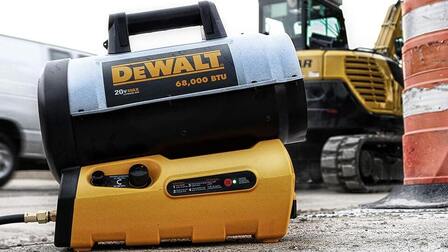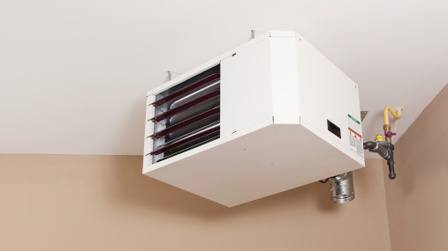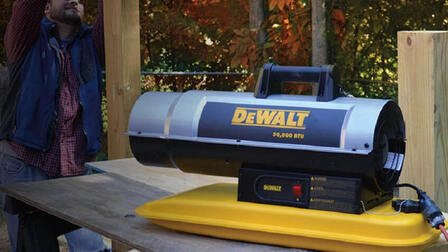A garage space heater can be a convenient solution for dealing with the cold season without breaking the bank. The market offers a wide range of models with various specifications, so no matter what your specific requirements are, you’re guaranteed to find something suitable with a little research.
Understanding how to choose a space heater might take some time if you’ve never done it before. But no matter if you’re looking for a reliable jobsite heater, or something simpler you can use in your garage at home, it shouldn’t take too long to find something that works.
Types of Space Heater
Space heaters are divided into two main categories: radiant heaters and convection heaters. Both designs have their advantages and disadvantages. Figuring out what type of heater is best for a garage mostly comes down to the size of the room.
1 - Radiant Heater
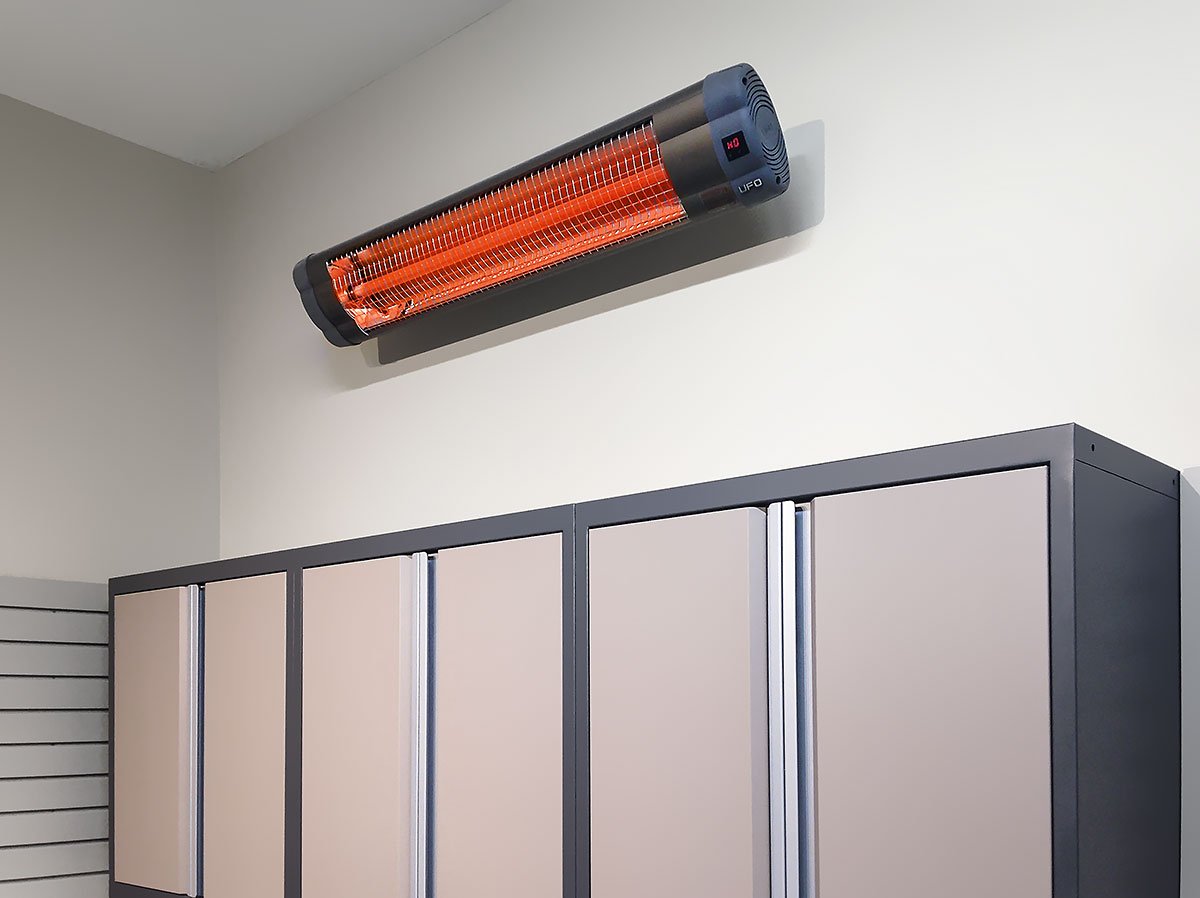
- Warms up targeted objects very quickly
- Even distribution of warmth
- Quiet operation
- Can start a fire if placed too close to any combustible objects
- Very hot to the touch
A radiant heater warms up objects in its line of “sight”, but doesn’t warm up the surrounding air directly. It accomplishes this by emitting thermal radiation, which warms up any objects it comes in contact with.
Radiant heaters can be very efficient when you need to quickly move from place to place, as they produce a warming effect almost immediately. This can also make a radiant heater the best garage heater for larger areas.
2 - Convection Heater
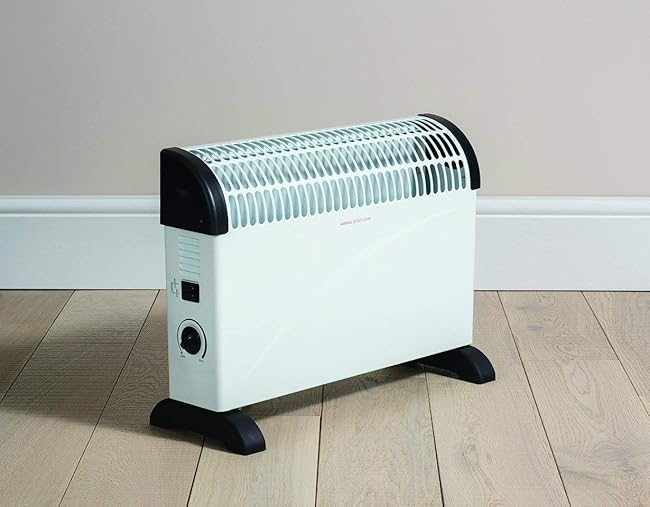
- Great for warming up a room for a longer period of time
- Warms up the air and not just specific objects
- Usually safe to touch (depends on the specific design)
- Fan-based models can be very loud
- Takes some time to heat the entire room evenly
On the other hand, a convection heater leverages the effect of convection to warm up the air in the room. Convection heaters use various methods to produce their effect. Some use a set of ceramic plates which get heated up with electricity.
Others use heating coils, and may additionally use a fan for forced air distribution. This design can make a good space heater for a garage, provided the area is small enough that the slower operation won’t be a problem.
3 - Hybrid Heater

- The best of both worlds in terms of performance and efficiency
- Small, unobtrusive design
- Significantly more expensive than traditional radiant and convection models
Hybrid designs also exist. They typically use radiant heat to warm up a heating element, and then distribute the heat through the room with convection. These models tend to be very compact and can easily fit in a smaller garage, but they are usually quite expensive.
How to Choose the Right Space Heater for Jobsite and Garage
When buying a space heater for your jobsite or garage, you will typically have different requirements compared to a heater for use at home. Portability can be great if you need to frequently move around a larger garage or jobsite. Depending on the number of people passing through the area on a daily basis, you might also want to look for a model with extra safety features.
1 - Area
Larger rooms need more heating power. However, a single portable radiant heater can sometimes be enough if you move it with you. If you need to heat up the entire room and keep it warm through the day, a convection heater will usually work better.
Keep in mind that for a larger area, a single heater might not be enough. You will need to do some rough calculations to figure out how much total heating power your room requires and buy multiple units accordingly.
Some workshops might also have outdoor areas. This is particularly common in jobsites. Outdoor space heaters tend to have unique features (like additional weather resistance) that make them suitable for outdoor use, but they are usually a poor choice for indoor use.
In some cases, it might even be impossible to use an outdoor heater indoors, for example, if it’s powered by a fuel that emits toxic fumes.
2 - Heat Power
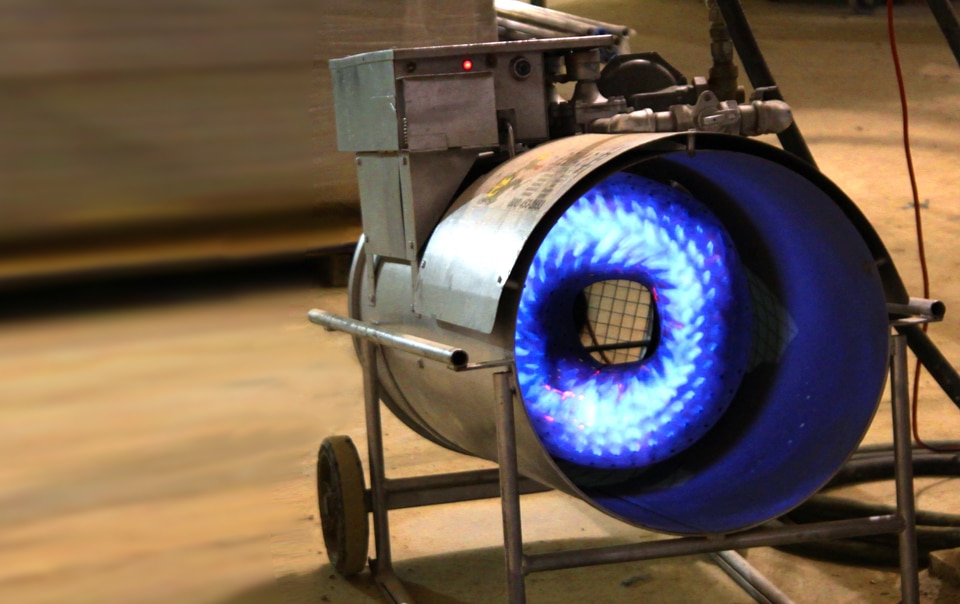
That’s where heat power comes in. Every space heater model has a specific power output, which should be clearly indicated by the manufacturer. This can allow you to estimate how powerful the ideal jobsite heater for your needs should be. If you’re working with BTUs (British thermal units), you may have to do some additional calculations, as many manufacturers don’t provide that rating explicitly.
To find out how many BTUs per hour a heating unit produces, just multiply its power output in watts by 3.41. As a rough estimate, a single square foot of area needs around 10 watts to heat properly.
Therefore, to figure out how many BTUs per hour your garage or jobsite requires, simply multiply its total area in feet by 34.4 (10 watts X 3.41 BTU/watt). For example, if your garage is 10x20 ft, this gives you an area of 200 sq.ft., for which you’ll need a heater capable of at least 200 X 34.41 = 6882 BTUs/hour.
3 - Power Source
Many of the popular models on the market use electricity as their power source. Some are hooked up directly to an outlet, while others can run on a battery. This is another factor that can affect the portability of the unit. Non-electric models typically use propane or other types of fuels.
Some people wrongly believe that propane-powered space heaters are unsuitable for indoor use. Some models are designed to be completely safe indoors. As long as you buy an indoor model, there is no danger in using it in your garage.
4 - Maintenance

Once you start comparing different models, you may quickly notice that many of the best-rated garage heaters are commonly praised for their ease of maintenance. That’s because once your heater breaks down, it can be very tricky to repair if the model is poorly designed.
Some of the cheaper models on the market make it almost impossible to do any maintenance and are usually replaced completely once they break down. Spending a bit more money is usually a smart investment if you want to minimize any headaches associated with maintenance.
5 - Convenience
A small, lightweight, and portable model is usually ideal for jobsites and larger garages. This will allow you to move it around easily and keep yourself warm as you move through the place. A radiant heater is particularly good in this regard. You won’t have to wait for the air to warm up all over again once you’ve relocated to a new area.
A convection heater will take longer to bring the temperature back up, on the contrary, it may not be able to warm up the whole room effectively enough if it’s too large.
6 - Safety
Convection heaters are generally safer than radiant models. That’s because they only warm up the air around them to safe levels. They are also usually designed in a way that the actual heating element is deep inside the unit and can’t be accidentally touched.
A radiant heater requires more caution. If you keep it pointed at something flammable for too long, it might eventually catch fire. Many radiant heaters also have their heating element exposed by design, so you have to be careful to avoid touching the model or having it come in physical contact with something combustible. For this reason, a convection heater can make a better choice for a jobsite heater if you don’t need to move around too much and the room is not too large.
Some models also come with various features that improve their safety. For example, the heater might detect when it’s been tipped over and automatically shut down. It may also shut off upon reaching a certain temperature to prevent accidental overheating, for example, if you accidentally leave something blocking the heater.
7 - Smart Features
Not every buyer needs these, but smart features can help you get the most out of your space heater in certain circumstances. For example, if you’re using multiple heaters to warm up a larger jobsite, it’s good to have a centralized overview of their current status. Otherwise, this feature is kind of useless as it only adds to the price.
8 - Brand
Look into each brand you’re considering as carefully as possible as well. Some have been on the market for a long time and have established a solid reputation, while others are associated with certain problems. Smaller and lesser-known brands aren’t necessarily bad. Quite the opposite, many of the newer companies on the market actually have solid products in their lineups. They just require a bit more research if you want to be sure about what you’re buying.
Warranty is a big factor here. All the best brands on the market will readily offer you a long warranty period, while others may not have any warranty at all.
9 - Price
Cheaper space heaters tend to end up more expensive in the long run. They may break down more easily, and when they do, it might be impossible to replace some of the affected parts. If you’re not on a limited budget, it’s a good idea to spend more on your space heater to ensure that it will last you a long time. There are some exceptions to this, as is the case in many markets. Some cheap models can work well in smaller rooms and as a supplement to larger heaters.
Jobsite Space Heater FAQs
Do all portable heaters require electricity?
My space heater smells like it is burning – is that normal?
Is it OK to leave the space heater on all night?
Do space heaters need ventilation?
Conclusion
It can take a while until you figure out how to choose a space heater that fits your needs perfectly. As you can see, there are many factors to consider.
Even if you have a good budget and are willing to spend more money, that still won’t make your choice any easier. Start with a list of requirements and specifications and direct your search according to that. It might take a while, but finding a good space heater can be a great long-term investment.

